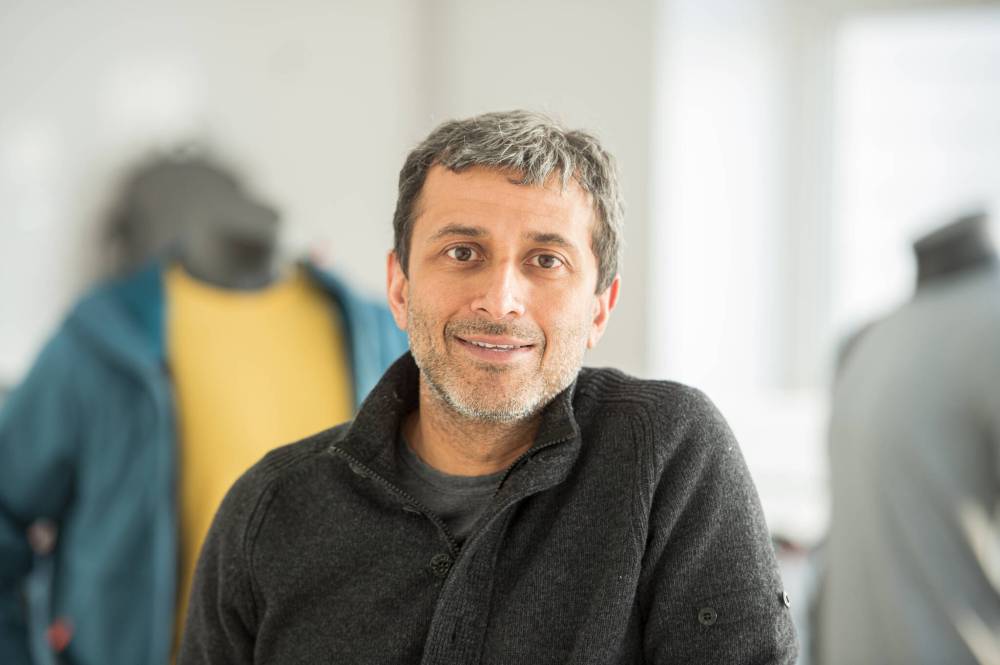[ad_1]
ASH Modha and a Mondetta Clothing project as well as a Cypher Technologies project have been recognized as part of this year’s Clean50 list recognizing Canada’s leaders in sustainability.
Manitoba’s representation on the list doesn’t dominate but the substance of the projects acknowledged could provide inspiration for others in this province.
As Modha, co-founder and CEO of Mondetta said, Manitoba’s greenhouse gas emissions might be very small relative to global emissions but he gets frustrated when that is used as an excuse to not do more.

Mike Sudoma / Winnipeg Free Press Files
Mondetta Clothing CEO, Ash Modha.
“That’s not the way we should think,” he said. “We need to create excellence here and show the world you can do it anywhere.”
Mondetta has been on a sustainability journey for some time, earning B Corp certification a few years ago.
Delta Management, which runs the Clean50 program, has honoured the company this year for its Operation Circularity program that utilized significant capital investment and human resources into converting close to 90 per cent of the company’s polyester and nylon lines into recycled fabrics.
(Modha himself, was also named as one of the Clean50 leaders.)
The company is committed to getting to net-zero emissions for most of its production and supply chain by 2028
After several years and significant expense — in the millions of dollars — it now has a data collection mechanism to accurately calculate all operational emissions.
And while it may not be one of the world’s largest apparel companies, the work it’s done helping fabric mills to perfect production using recycled material is now available for other apparel companies to utilize.
Todd Burns, the founder and CEO of Cypher Environmental, has been preaching about a new way to achieve dust abatement for many years. Even though he continues to be stymied in his efforts to sell his environmentally friendly technologies — as opposed to the traditional, environmentally harmful salt-based products — to public sector organizations in Canada, he’s having increasing success with customers around the world, including in Africa.
The company’s sales volumes are now exploding, growing by about 50 per cent annually.
Cypher was recognized this year by Clean50 for its Cypher Green Roads program, where the company donates product to communities neighbouring its industrial clients worth up to five per cent of the project value.
Specifically the recognition was for a project in Mali, Africa, near a mine built by the Canadian firm B2 Gold as part of the work in the resettlement of a village.
While the resettlement was considered a success, the community was plagued by dust from the new road through the village. The partnership with B2 Gold included using the mining company’s equipment to apply Cypher’s DUST/BLOKR.
The connection with B2 Gold was especially significant for Burns because it was that company’s corporate social investment near another of its mines in Namibia that originally inspired Burns to launch Cypher Green Roads.
MIKAELA MACKENZIE / WINNIPEG FREE PRESS FILES
Todd Burns, CEO of Cypher Environmental.
“I was blown away by the amount of community engagement projects they were doing,” said Burns. “I realized that we as a company needed to do more than just make our customers more sustainable by virtue of using our product.”
The Mali project was in the low millions of dollars, so Cypher’s contributions in even that one project was substantial.
The program is only a couple of years old and Burns believes that in addition to the material quality of life benefits communities can experience, it also helps with the general level of education about the existence of higher performing alternatives to traditional road salt used for de-icing in the winter time and dust suppression in the spring and summer.
“This gets everyone on the same page sharing best practices,” he said.
Knowledge sharing, especially in small Indigenous communities — where Cypher has done work — is passed down through the generations.
“We send people to do training on these programs and that community now has the skill set to build better roads and more sustainable communities for the long term,” he said.
Mondetta has a policy of not announcing any of its awards or recognitions but instead just concentrating on its sustainability efforts.
“When we first started working at sourcing recycled materials, it was a disaster,” he said. “And people laughed at us, saying no one would notice, and that it’s just about feeling good. It’s not about that, it’s about doing the right thing.”
martin.cash@freepress.mb.ca

Martin Cash
Reporter
Martin Cash has been writing a column and business news at the Free Press since 1989. Over those years he’s written through a number of business cycles and the rise and fall (and rise) in fortunes of many local businesses.
Read full biography
[ad_2]
Source link

